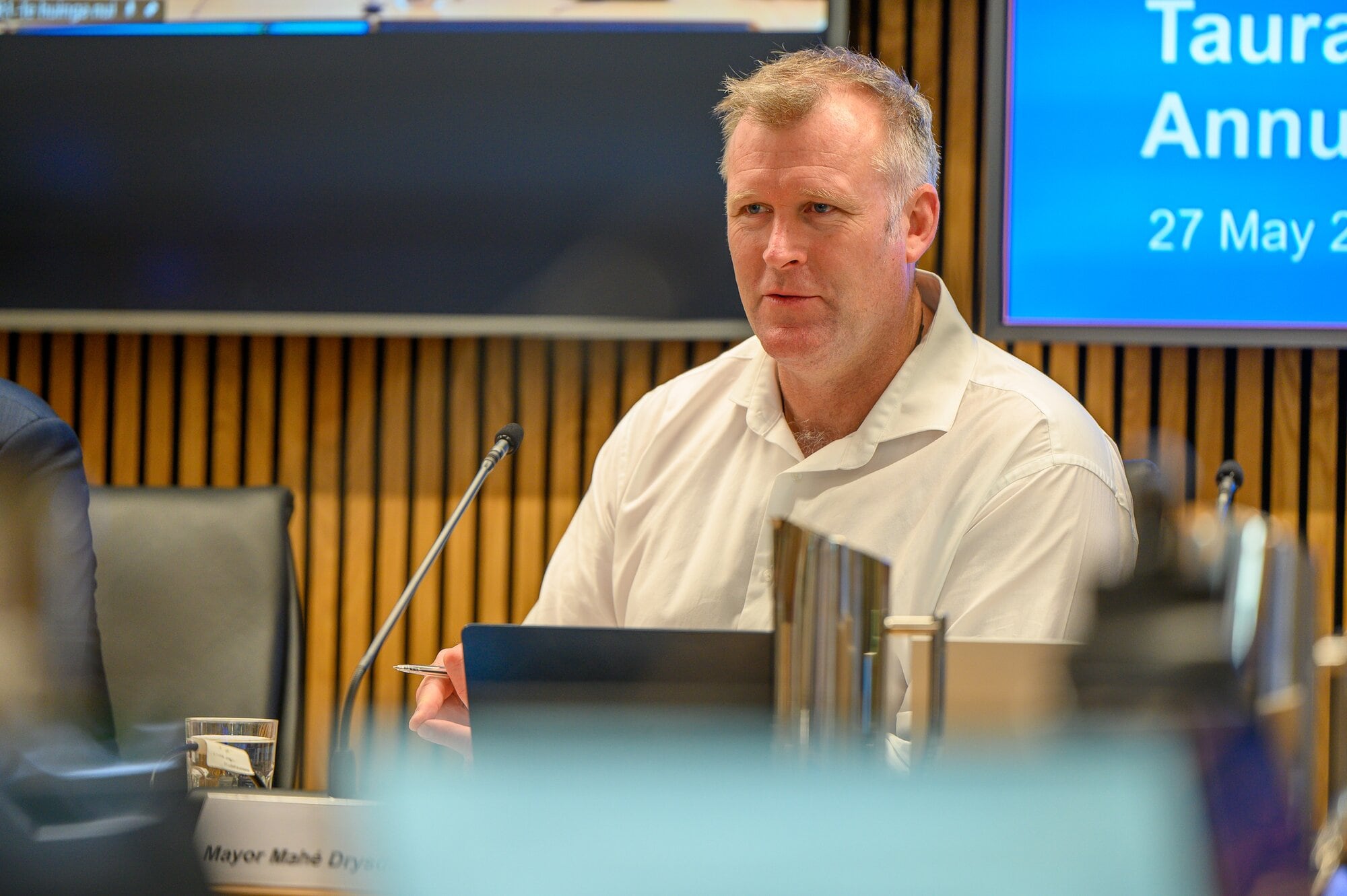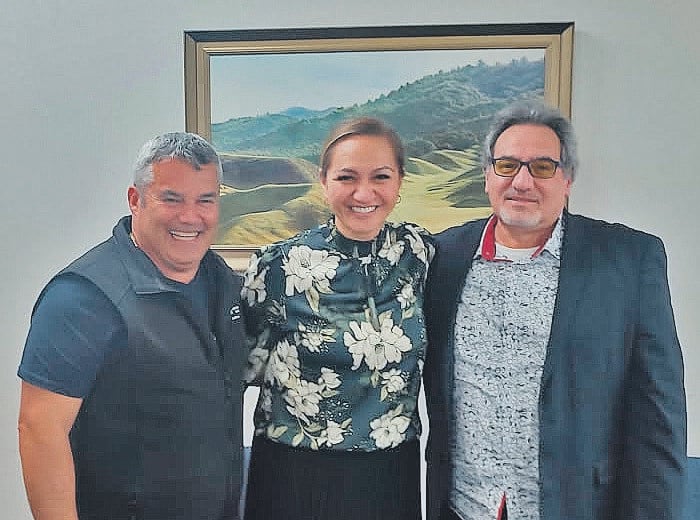A joint statement by three Eastern Bay of Plenty mayors has them united against any attempt at amalgamating Bay of Plenty’s councils.
“As mayors of the Eastern Bay, we know our communities value the accountability, and the control they get from our three councils.
“Amalgamation would see our communities swallowed into Tauranga and whose interests does that serve? Not the interests of the Eastern Bay of Plenty,” the statement said.
The comments come on the back of Tauranga Mayor Mahé Drysdale’s push to start conversations about changing the way Bay of Plenty councils are arranged.
At a recent Bay of Plenty Mayoral Forum, Drysdale said communities were crying out for things to be delivered more efficiently and effectively.
He said there were seven councils represented around the forum table, which meant seven times the overhead.
“We can wait five years and have the Government do it for us or we can be proactive and say, let’s look at it.”
Drysdale will also be speaking to a remit put to this week’s Local Government New Zealand conference by Tauranga City Council for a review of local government arrangements to achieve better balance. The remit was supported by LGNZ’s Metro Sector councils.
Whakatāne Mayor Victor Luca said he could find no evidence that amalgamation of councils would result in lower rates.
He cited two academic studies published in the past three years that pointed against any efficiencies being achieved by amalgamation.
A 2022 report called Does Size Matter, from independent Crown organisation the Infrastructure Commission, found little evidence of cost efficiencies from larger local governments.
The report looked at whether council size and structure affected road maintenance, building consents and council overhead costs.

Tauranga mayor Mahé Drysdale at a Tauranga City Council meeting. Photo / David Hall
“Our analysis suggests that population size neither decreases nor increases the cost to provide these three services,” the report stated.
Luca also referenced a 2024 economic paper by University of Otago professor Tom Stannard and TDB Advisory’s Philip Barry about scale efficiency gains in electricity distribution.
The paper looked at public and private organisations and found that potential gains from scale alone, without considering population density, were very limited.
“The only way that reducing the number of slices in a pie can result in any benefit is if the pie also shrinks,” Luca said.
“I’m actually quite annoyed that Drysdale makes the argument that everybody trots out without evidence. The real evidence is there, and he completely ignores it.”
He felt Whakatāne district would be the loser in any amalgamation arrangement with the wider Bay of Plenty.
“We represent 16% of the population of the Bay of Plenty, and you only have to look at how we fared in receiving funding through the Regional Transport Committee. We only got 1% of the budget request allocated to us.”
He felt there were efficiencies that could be made through the councils working more closely together.
“For example, we’re all using different enterprise software. That is something that could easily be fixed without throwing the baby out with the bathwater.”
Ōpōtiki Mayor David Moore said he felt Drysdale should be talking to his community about how they felt before he started talking about amalgamating councils.

Whakatāne would be the loser in a Bay of Plenty council amalgamation, Mayor Victor Luca says. Photo / Andrew Warner
“The first thing you learn in local government is you need to talk to your community first, before we make plans.”
Moore was doubtful that amalgamation would create efficiencies, pointing out a number of failures of central government in providing police, education and health services to the region.
“That day [of the mayoral forum] we had a presentation showing we are 1700 doctors short in New Zealand.
“We’ve got a net increase in police of less than 20.”
He also referenced the recent reduction in gynaecological and obstetrics services that sees pregnant women having to be rushed to Tauranga for emergencies, and Ōpōtiki College having issues with black mould in classrooms last year.
He said there had been a great deal of work done recently on possible funding solutions for councils.
“For example, the GST content of rates that gets forwarded to central. A tax on a tax, some say.
“There is no resistance to working smarter and sharing services wherever possible, but scale does not always mean saving for the community - something to think about on your next trip to the supermarket or when paying your latest power or insurance bills.
“The same out of control costs have hit councils too, which does nothing to help keeping costs down.”

Kawerau Mayor Faylene Tunui.
Kawerau Mayor Faylene Tunui said her community was against amalgamation.
“Mayor Drysdale can speak for Tauranga, but we know our communities are firmly rooted in the Eastern Bay of Plenty and that’s where our people want their representation to be.
“Our three councils are busy implementing our joint spatial plan and joint economic development plan. That’s our priority, not theoretical amalgamation discussions,” Tunui said.
What other Bay mayors say
Western Bay of Plenty Mayor James Denyer previously told Local Democracy Reporting he did not believe his community supported amalgamating with Tauranga.
Rotorua Mayor Tania Tapsell said councils should not be afraid of change but “negative experiences” from health and polytechnic mergers made communities wary.
Bay of Plenty Regional Council chairman Doug Leeder said work needed to be done to understand where and how services were best delivered - nationally, regionally and locally - to inform the long-running debate.
- Additional reporting by Alisha Evans
LDR is local body journalism co-funded by RNZ and NZ On Air.




5 comments
amalgamation
Posted on 16-07-2025 12:22 | By PeterMcK
discussion of amalgamation is basically a way of avoiding thinking. The average size of New Zealand councils is much larger than the international norm. In Germany, a much more efficient economy than New Zealand, municipalities average 8000 population. Elsewhere people focus on what's the best way for managing and delivering each local government service. France's communes, average population 1500, invented the major French water companies. Eastern Bay's mayors are absolutely on to it in emphasising the importance of local representation and being able to speak up for their communities in response to central government's poor performance in many service areas. Before the Mayor of Tauranga starts arguing for amalgamation, he should concentrate on building stronger relationships between his council and the communities it serves.
Well said…
Posted on 16-07-2025 15:11 | By Shadow1
…Peter McK, I’m impressed that the smaller BOP council Mayors can see the obvious correlation between small populations and effective public outcomes. Tauranga Mayors past and present have never seen that and have always pushed for amalgamation of one description or another. Look at the Shires in Oz, they have urban boundaries, their townships are clean and well groomed. Now look at Auckland, it’s an overpopulated mess and always will be.
Come on Tauranga, don’t believe the bull about efficiencies of scale. Stay in control of your own City.
Shadow1.
The Master
Posted on 16-07-2025 17:22 | By Ian Stevenson
The Three musketeers have very quickly realised that two of their number would be out of a job permanently... HMMMM I wonder if that is the decision maker here?
The Master
Posted on 16-07-2025 17:29 | By Ian Stevenson
This is interesting...
There are 78 Councils in NZ, 11 regional and 67 the rest.
Auckland is the result of merging multiple councils (9?), it is by far the biggest Council in NZ and when merged not one single benefit touted prior has been achieved. A few examples....
1 After merging there was to be staff number reduction and staff cost savings, the opposite happened
2 There was to be better co-ordination of infrastructure... that has not happened either
3 Overall cost savings and efficiencies (100% never was going to be true before, then or since as its contrary to the in-grained fabric of any bura-rat 24/7!). Costs blew out everywhere.
Lets not forget that Napier/Hastings rejected the scam, The public served up Wellington the truth.
If each is a mess, then merging them wont make it better
Best statement so far...
Posted on 17-07-2025 12:45 | By morepork
"If each is a mess, then merging them won't make it better."
Right on the button, Ian.
This is apposite and succinct.
Instead of seeking to expand the Empire, there should be a desire to engage properly (and Democratically) and provide the essential services that we expect from Council.
I agree with PeterMcK and Ian Stevenson (excellent posts with interesting data from both of them.)
The current council and leadership are no better than the Commission was and the fundamental attitudes needed to effectively manage a great city have not been shown.
Community feedback has been ignored or overridden, shockingly bad decisions (the new Council building) regarding the husbandry of OPM (Other People's Money), vanity projects are being pursued, and no real effort to attack waste in Council has been sincerely attempted.
It's a bitter disappointment to those of us who love Tauranga.
Leave a Comment
You must be logged in to make a comment.